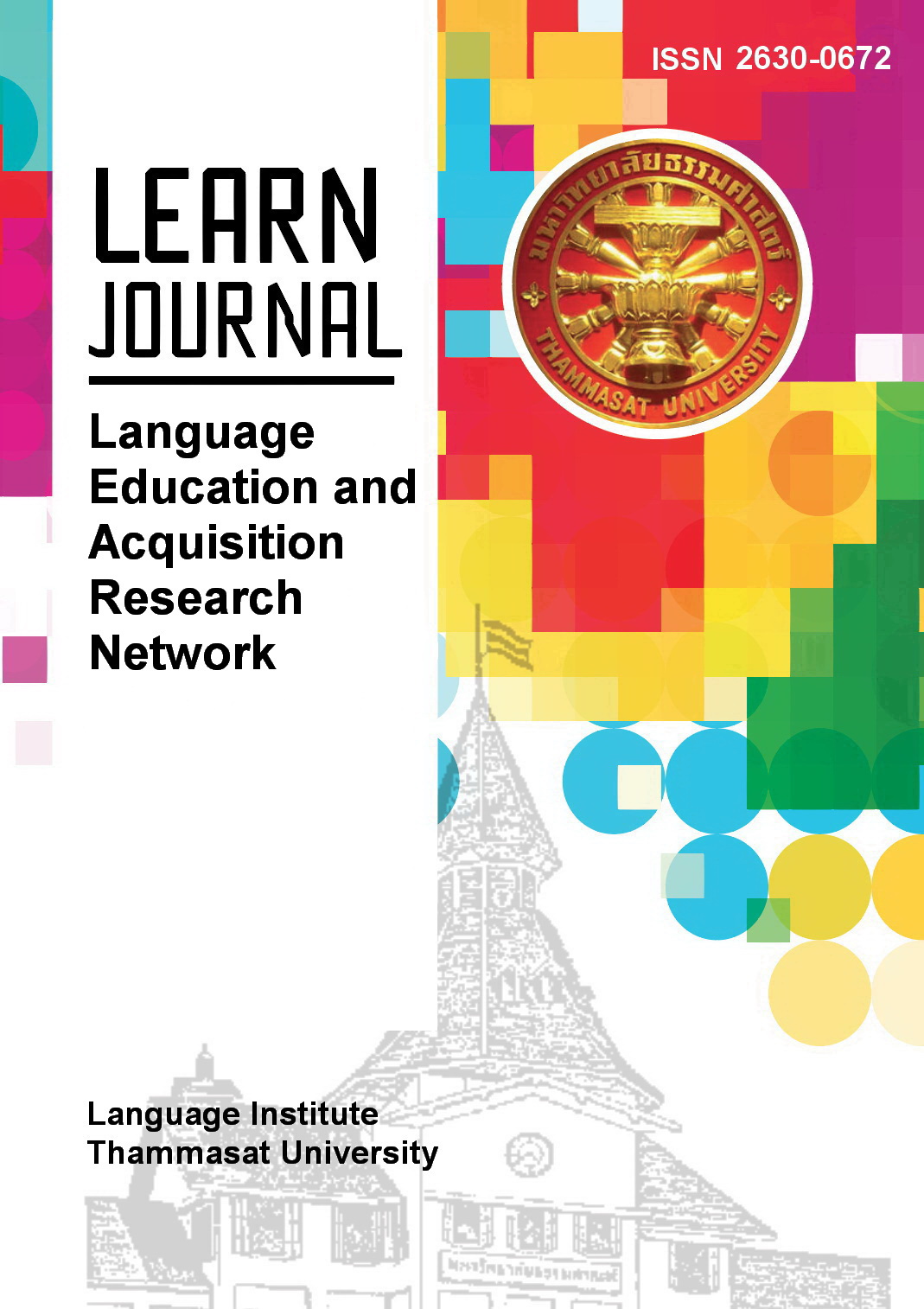Computer-Aided Argument Mapping within Metacognitive Approach: Its Impact on Students’ Argumentative Writing Performance and Self-Regulated Learning
Main Article Content
Abstract
Digital visual mapping to date has recently been implemented in an English Foreign Language (EFL) classroom. However, there is a growing need to implement this digital mapping tool within a strategic approach for more effective and self-regulated learning. This paper aimed to investigate the effects of Computer-Aided Argument Mapping (CAAM) within the metacognitive approach on Thai EFL learners’ argumentative writing performance across the development of writing content and writing coherence and their self-regulation of learning. A mixed-method type of research was employed involving a one-group of pre- and post-test design. A total of 21 Second Year college students was purposively selected as samples. A Self-Regulation of Learning Scale (SRS) was also used to track the development of their self-regulation. Results reveal that students’ argumentative writing performance made noteworthy gains as manifested by a significant difference between their pre- and post- test results. Furthermore, five of six SRL components reveal a significant relationship with students’ argumentative writing performance indicative that they have become more self-regulated in their learning in terms of planning, self-monitoring, evaluation, effort, and self-efficacy. Qualitative findings reveal that the participants have positively welcomed the use of CAAM on their writing processes and self-regulation. Finally, the study findings provide thoughtful insights into utilizing digital mapping within the metacognitive approach to improve students’ argumentative writing skills and self-regulated learning as well as revolutionize EFL learning classrooms in this digital period.
Article Details
References
Bozorgian, H. (2014). Less-skilled learners benefit more from metacognitive instruction to develop listening comprehension. International Journal of Research Studies in Language Learning, 4(1), 3-12. https://doi.org/10.5861/ijrsll.2014.748
Creswell, J. W., & Plano-Clark, V.L. (2011). Designing and conducting mixed method research (2nd ed.). Sage Publications, Inc.
Davies, W.M. (2011). Mind-mapping, concept mapping and argument mapping: What are the differences and do they matter? Higher Education, 58, 799-820.
Davies, W.M., Barnett, A., Gelder, T. van (2021). Using computer-aided argument mapping to teach reasoning. In J. Anthony Blair (Ed.), Studies in critical thinking 2nd Edition, (pp.115-152). Windsor Studies in Argumentation, Windsor, ON, Canada
Dwyer, C.P., Hogan, M.J., & Stewart, I. (2011). The promotion of critical thinking skills through argument mapping. In C.P. Horvart, & J.M. Forte (Eds.), Critical thinking (pp.97-122). New York: Nova Science Publishers.
Eccius-Wellman, C., & Santana, J. (2020). Variables that influence language proficiency in students from public and private high schools in Mexico. MEXTESOL Journal, 44(2), 1-13.
Eftekhari, M., & Sotoudehnama, E., Marandi, S. (2016). Computer-aided argument mapping in an EFL setting: Does technology precede traditional paper and pencil in developing critical thinking? Educational Technology Research and Development, 64, 339-357.
Flavell, J.H. (1979). Metacognition and cognitive monitoring: A new area of cognitive-developmental inquiry. American Psychologist, 34, 906-911.
Harrell, M. (2007). No computer program required: Even pencil-and-paper argument mapping improves critical thinking skills. Teaching Philosophy, 31(4), 351-374.
Harrell, M., & Wetzel, D. (2013). Improving first-year writing using argument diagramming. In M. Knauff, M. Pauen, N. Sebanz, and I. Wchsmuth (Eds.), Proceedings of the 35th Annual Conference of the Cognitive Science Society (pp. 2488-2493). Cognitive Science Society.
Hyland, K. (2013). Writing in the university: Education, knowledge, and reputation. Language Teaching, 46(1), 53-70.
Malmir, A., & Khosravi, F. (2018). The effect of argument mapping instruction on L2 writing achievement across writing task and writing components: A case study of Iranian EFL Learners. Applied Research on English Language, 7(4), 514-538.
O’Malley, J.M., & Chamot, A.U. (1990). Learning strategies in second language acquisition. Cambridge University Press.
Pahlavani, P. & Maftoon, P. (2015). The impact of Using computer-aided argument mapping (CAAM) on the improvement of Iranian EFL learners’ writing self-regulation. The Journal of Teaching Language Skills, 7(2), 127-152.
Pinktwart, N., Ashley, K.D., Lynch, C., & Aleven, V., (2009). Evaluating an intelligent tutoring system for making legal arguments with hypotheticals. International Journal of Artificial Intelligence in Education, 19(4), 401-424.
Pintrich, P. R., & Schunk, D. H. (2002). Motivation in education: Theory, research and applications (2nd ed.). Prentice Hall Merrill.
Robillos, R.J. (2019). Crossing metacognitive strategy instruction in an EFL classroom: Its impact on Thai learners’ listening comprehension performance and metacognitive awareness. Asian EFL Journal, 21(2), 311-336.
Robillos, R.J. & Phantharakphong, P. (2020). Enhancing EFL learners’ argumentative abilities in written composition and critical thinking dispositions through argument mapping within metacognitive approach. Asian EFL Journal, 27(3.3), 181-208.
Robillos, R.J. (2020). Instruction of metacognitive strategies: Its role on EFL learners’ listening achievement and awareness of their metacognitive listening strategies and self-regulation. Asian EFL Journal, 27(3.2), 442-452.
Robillos, R.J. (2021). Learners’ writing skill and self-regulation of learning awareness using computer-assisted argument mapping (CAAM). Journal of Teaching English with Technology, 21(4), 76-93.
Sweller, J. (1994). Cognitive load theory, learning difficulty, and instructional design. Learning and Instruction, 4, 295-312.
Toering, T. T. (2011). Self-regulation of learning and the performance level of youth soccer players. S.N.
van Gelder, T. (2007). “The rationale for RationaleTM.” Law, Probability, and Risk, 6(1), 23-42. https://doi.org/10.1093/lpr/mgm032
van Gelder, T. (2015). Using argument mapping to improve critical thinking skills. In M. Davies and R. Barnett (Eds.), The Palgrave handbook of critical thinking in higher education (pp. 183-192). Palgrave McMillan.
Weigle, S.C. (2013). ESL writing and automated essay evaluation. In M. Shermis, & J. Burstein, (Eds.). Handbook on Automated Essay Evaluation.: Current Applications and New Directions (pp. 36-54). New York: Routledge.
Zheng, J. (2018). The metacognitive strategy in English listening comprehension. Theory and Practice in Language Studies, 8(2) 226-231. doi: http://dx.doi.org/10.17507/tpls.0802.07
Zimmerman, B.J (2008). Investigating self-regulation and motivation: historical background, methodological development, and future prospect. American Educational Research Journal, 45(3) 166-185.


